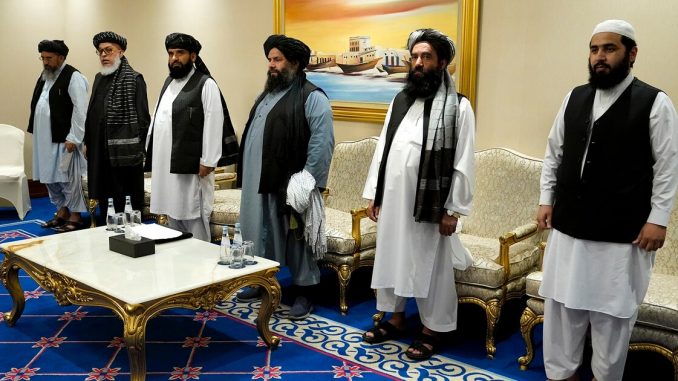
ISLAMABAD — Afghan government negotiators and the Taliban have agreed to have Islamic law and teachings guide them in peace talks now underway in Qatar, according to a document obtained Thursday.
The document details a 21-point list of rules and procedures for the negotiations and sheds light on what the talks, which are taking place behind closed doors, actually look like. The warring sides signed the document last week in Doha, Qatar, where the U.S.-brokered talks began in September and where the Taliban have for years maintained a political office.
Soon after their ceremonious start — the only part that was public — the talks hit an impasse until last week, when in a breakthrough, the two sides agreed on rules and procedures for the negotiations. The Associated Press on Thursday obtained a copy of that document.
The breakthrough was significant as it meant the sides could soon start to negotiate issues that could end decades of fighting in Afghanistan and determine the country’s post-war future — such as a cease-fire, what to do with armed Taliban fighters and militias loyal to warlords allied with the Kabul government. Constitutional changes and the rights of women and minorities are also expected to be on the agenda.
/cloudfront-us-east-1.images.arcpublishing.com/mco/WFLYUBJ3PFCXDJEGMNYB2WRDPU.jpg)
According to Afghans familiar with the talks in Doha, a critical sticking point was whether the deal the U.S. signed with the Taliban in February would be the foundation for the Afghan-Taliban talks. The Afghans spoke on condition of anonymity to discuss the peace process.
The Taliban were adamant that it be a blueprint, but government negotiators were resistant as Kabul representatives were not party to the U.S.-Taliban accord. That deal set out the guidelines for the eventual withdrawal of U.S. and NATO troops from Afghanistan, ending America’s longest military engagement.
American troop levels in Afghanistan would be reduced to 2,500 by mid-January, according to U.S. Gen. Mark Milley, chairman of the Joint Chiefs of Staff, after President Donald Trump recently decided to accelerate the troops withdrawal. According to Milley, the smaller U.S. force would operate from “a couple of larger bases,” along with several smaller ones, in order to continue its current missions of combating extremist groups like al-Qaida and training and advising Afghan defense forces.
/cloudfront-us-east-1.images.arcpublishing.com/mco/EFF5QGIGL5GKJDMYS54ZNHPGWA.jpg)
The U.S.-Taliban agreement from Feb. 29 also committed the Taliban to preventing any attacks against American interests in Afghanistan.
Despite resistance by Afghan government negotiators, the U.S.-Taliban deal made it into the introduction part of the 21-point document on the rules and procedures for the Doha talks, after stating that Islamic law would be the foundation for the negotiations.
“Afghanistan’s honor and dignity lies in its Islamic identity and national unity,” the document says. “It’s only through the implementation of Islamic justice that Afghanistan can protect its sovereignty and avoid direct and indirect interference.”
The negotiations between the Afghan government and the Taliban are likely to be protracted and their outcome is far from certain, but Torek Farhadi, a former Afghan government adviser and political analyst, says that “everyone with reason is hoping for a power-sharing agreement.”
A power-sharing deal, one in which the Taliban would be part of the political mainstream in a post-war Afghan society, is the only solution that could protect the civilians from continuing to bear the brunt of the conflict, Farhadi said. “For Afghan civilians, between COVID, poverty, the winter and relentless violence, the situation has become unbearable.”
“The peace process is struggling even at this early moment, and any successful negotiation leading to a settlement will be long and fraught,” said Michael Kugelman, deputy director of the Asia Program at the Washington-based Wilson Center.
/cloudfront-us-east-1.images.arcpublishing.com/mco/L45ZCWHJN5HC7D4R5CLWKBMP64.jpg)
The 21-point list in Pashto and Dari — Afghanistan’s two official languages — warns warring sides against leaking documents or speaking to the media during the negotiations. It also calls for the negotiations to be conducted with “honesty, sincerity and in good atmosphere.” It further urges “mutual respect and decency” to avoid mistrust.
Every meeting between the two sides in the talks will start and end with prayers, the document says, and when the two sides disagree, separate teams will be formed to find alternative solutions, including situations when religious interpretations are disputed.
Associated Press writer Tameem Akhgar in Kabul, Afghanistan, contributed to this report.


Be the first to comment